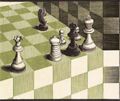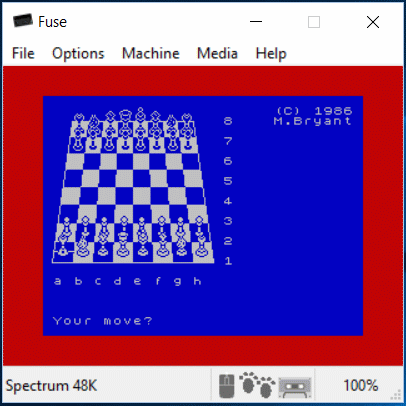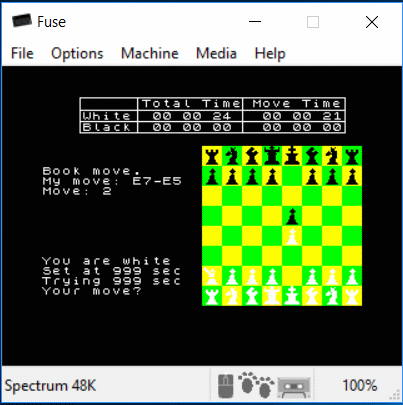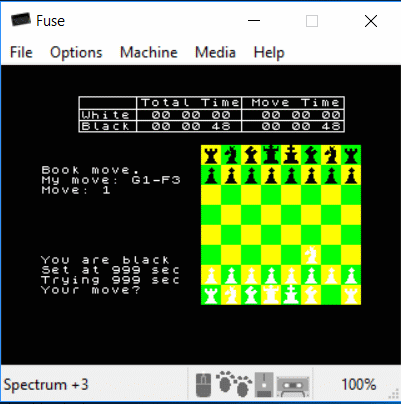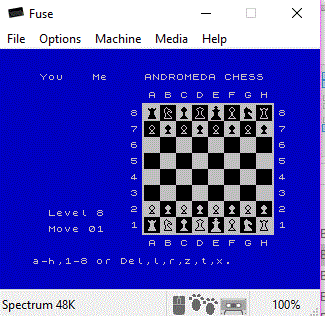The Sinclair 48K was a Z80 home computer that came out in 1982 (36 years ago!) with 48K RAM and the CPU ran at 3.5 Mhz.
So anyway on the Fuse Emulator I set up a game between Superchess 3.5 written by Chris Whittington in 1985 (33 years ago) against Mephisto Monte Carlo IV Limited Edition from 1990, a chess program by Ed Schroeder.
Mephisto Monte Carlo IV Limited Edition - 1990
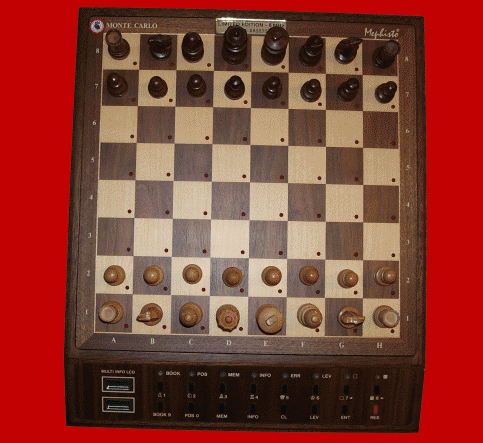
http://www.spacious-mind.com/html/monte ... iv_le.html
Fuse Emulator - Spectrum 48K - Superchess 3.5 - 1985
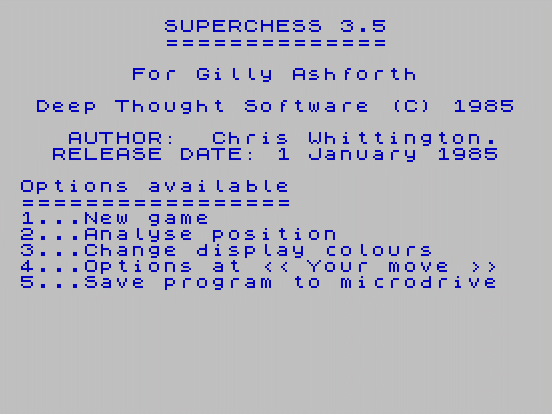
Chris Whittington famous for Chess System Tal, created his first programs on the Spectrum 16K in 1983 with Superchess 1.0. It was only later around 1987 that he started working on Commodore Amiga/Atari ST and later still with DOS and PC.
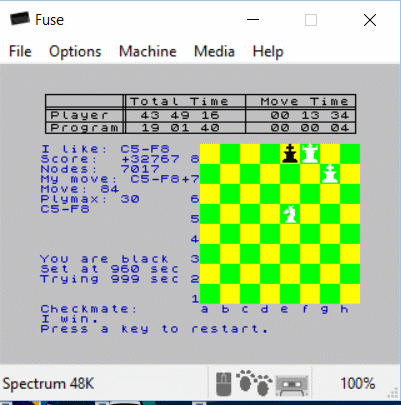
Originally Superchess 3.5 on a Spectrum 48K Z80 3.5 MHz had a play strength of approximately 1500 ELO.
Well, I knew that Superchess 3.5 wouldn't have much of a chance playing at this speed against Monte Carlo 4 LE, so therefore instead I set up Superchess 3.5 to play 960 seconds per move = 16 minutes per move and therefore Superchess 3.5 had 32 times more thinking time than MC4 LE! who played at 30 seconds per move. However speeding up the emulator to 3200% the thinking time was equalized where both played at around 30 seconds per move in real time. In fact the average thinking time that Superchess 3.5 used had it played in real time was 13 minutes and 36 seconds per move.
MC4 LE is rated at 2016 ELO in Active Chess at Schachcomputer.Info.
https://www.schachcomputer.info/html/ak ... liste.html
105 Mephisto Monte Carlo IV LE 2016 218 (+ 92,= 46,- 80), 52.8 %
Tasc R30 V2.2 1 (+ 0,= 0,- 1), 0.0 %
Mephisto Magellan 2 (+ 2,= 0,- 0), 100.0 %
Phoenix Resurrection Ruffian 1 (+ 0,= 0,- 1), 0.0 %
Mephisto Risc 2 / CM 14 MHz Gideon 3.1 1 (+ 0,= 0,- 1), 0.0 %
Mephisto Mondial 8 (+ 7,= 0,- 1), 87.5 %
Mephisto Academy 10 (+ 4,= 4,- 2), 60.0 %
At Schacomputer.Info you can see that MC4 LE played 218 Active chess games in order to obtain its active chess rating of 2016 ELO. The above is just a small example of the opponents it played against.
OK back to Superchess 3.5, if you take a speed doubling factor of 100 ELO per doubling you would have the following:
Superchess 3.5 Speed Doubling
30S = 1500 ELO
60S = 1600 ELO
120S = 1700 ELO
240S = 1800 ELO
480S = 1900 ELO
960S = 2000 ELO
Therefore with the 960 seconds per move setting, I figured that Superchess 3.5 might be able to compete with Mephisto Monte Carlo IV Limited Edition playing at 30 seconds per move.
Here is the game:
[Event "Test Match"]
[Site "Pelham, AL"]
[Date "2018.03.03"]
[Round "1"]
[White "SP48K Superchess 3.5, 960S."]
[Black "Mephisto Monte Carlo IV LE, 30S."]
[Result "1-0"]
[ECO "A29"]
[WhiteElo "2000"]
[BlackElo "2016"]
[Annotator "spacious_mind"]
[PlyCount "167"]
[EventDate "2018.03.03"]
[EventCountry "USA"]
1. d4 d5 2. e3 e6 {SP48K Superchess 3.5 out of book} 3. Bb5+ {Mephisto Monte Carlo 4 LE out of book} Bd7 4. Nc3 Bb4 5. Bd3 c5 6. dxc5 Bxc3+ 7. bxc3 Qa5 8. Bd2 Qxc5 9. Rb1 Bc6 10. Nf3 Qa3 11. Nd4 b6 12. Qc1 Qxc1+ 13. Rxc1 Nf6 14. Nb5 Kd7 15. f3 e5 16. Rb1 a6 17. Na3 Kc7 18. Be2 b5 19. O-O h5 20. h4 Nbd7 21. Kh2 Rae8 22. Kh3 Re6 23. g4 hxg4+ 24. fxg4 Ne4 25. Be1 f6 26. h5 Rhe8 27. Rb4 Ndc5 28. Nb1 a5 29. Rb2 Na4 30. Rxb5 Ng5+ 31. Kh2 Bxb5 32. Bxb5 Rb8 33. c4 Nb6 34. Bxa5 Kb7 35. cxd5 Nxd5 36. Bd2 Ne4 37. Re1 Nxd2 38. Nxd2 Nc3 39. Bd3 e4 40. Bc4 Rd6 41. Nb1 Rc8 42. Bb3 Nxa2 43. Kg3 Nb4 44. Re2 Nd5 45. c4 Nb4 46. Nd2 Rd3 47.
Ba4 Kb6 48. Kf2 Ra3 49. Bd7 Nd3+ 50. Kg3 Rd8 51. Bf5 Nc1 52. Rg2 Rxe3+ 53. Kf4 Rdd3 54. Bxe4 Re2 55. Nf1 Rxg2 56. Bxg2 Rd4+ 57. Kf5 Rxc4 58. Ne3 Rd4 59. Kg6 Rd7 60. Bf1 Nd3 61. Bxd3 Rxd3 62. Nf5 Rd7 63. Nxg7 Rd4 64. Kf5 Kc6 65. Ne6 Rd2 66. Nf4 Rd4 67. h6 Rd7 68. Kg6 Rd6 69. h7 f5+ 70. Kg5 Rd8 71. gxf5 Rh8 72. Kh6 Kc7 73. Kg7 Rxh7+ 74. Kxh7 Kd6 75. Ng6 Kd5 76. f6 Ke6 77. Kg7 Kd5 78. f7 Kc4 79. f8=Q Kd5 80. Qb4 Ke6 81. Qc4+ Kd7 82. Qc5 Kd8 83. Ne5 Ke8 84. Qf8# 1-0
Critical Position
[fen]8/6p1/1k3pK1/5N1P/6P1/3r4/8/8 w - - 0 62[/fen]
Overall for most of the game Mephisto Monte Carlo 4 LE seemed to be the better program, but missed a few good opportunities to win.
In the above position however Superchess 3.5 has the edge and Mephisto has only one move that draws which is 62. ... Rd1! everything else loses. MC4 LE played 62. ... Rd7? and so loses a game in the endgame which perhaps it should have won.
Lichess Evaluation
https://lichess.org/x4d5FSQh
SP48K Superchess 3.5, 960S. (2000)
6 Inaccuracies
6 Mistakes
1 Blunders
34 Average centipawn loss
Mephisto Monte Carlo IV LE, 30S. (2016)
10 Inaccuracies
6 Mistakes
3 Blunders
49 Average centipawn loss
Final Position
[fen]4kQ2/6K1/8/4N3/8/8/8/8 w - - 0 84[/fen]
Well a speed doubling of 5 times 100 ELO seems to be about right giving Superchess 3.5 a rating of @ 2000 ELO playing on approximate hardware of a Z80 in a range somewhere between 94 to 112 MHz in speed.
How much more it could improve is impossible to know as 999 seconds per move is the max setting for Superchess 3.5. I played at 960 seconds per move.
To conclude, Superchess 3.5 on good hardware is another good program for players who play at around 2000 ELO. If you are a 1500 ELO player, then you would also probably have fun playing Superchess 3.5 on an original Sinclair Spectrum 48K computer or emulator.
Best regards

